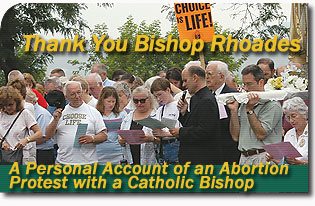 When I heard that my bishop, Most Reverend Kevin Rhoades, of Harrisburg, Pennsylvania, was planning a procession and rosary in front a local abortion clinic, I was excited and pleasantly surprised. Due to their busy schedule and load of administrative work, few bishops would take three hours early on a Saturday morning to lead their flock in protest.
When I heard that my bishop, Most Reverend Kevin Rhoades, of Harrisburg, Pennsylvania, was planning a procession and rosary in front a local abortion clinic, I was excited and pleasantly surprised. Due to their busy schedule and load of administrative work, few bishops would take three hours early on a Saturday morning to lead their flock in protest.
While this may be understandable, it is a pity. Amid the chaos that defines modern life, we faithful are in great need of shepherds who will take definitive stands and lead us to react against evil. I thank Bishop Rhoades for doing exactly this on Saturday, June 11 and feel honored at having been present.
A Tradition Begins
Bishop Rhoades began the weekly abortion protest years ago, while he was still a parish priest in Harrisburg. Every Saturday morning, he would lead his parish to the Hillcrest Women’s Medical Center on Front St. in Harrisburg to pray a rosary asking for an end to abortion. He would also pray that the women seeking abortions would have a change of heart.
After being transferred from his diocese, he studied in Rome, became rector of Mount St. Mary’s Seminary in Emmitsburg, Maryland and recently was consecrated as bishop and installed in the Harrisburg diocese. During his absence, his parishioners continued the tradition Father Rhoades had begun. Apparently, he never forgot about it either. When installed as bishop in Harrisburg, he decided to lead his faithful in protest once again.
The Event
To begin the event, Bishop Rhoades celebrated Mass at 8:00 a.m. and wore red vestments for the occasion. Many priests were present, including EWTN host, Fr. John Trigilio.
After Mass, we drove to a park, a few blocks from Hillcrest Clinic, where a statue of Our Lady of Fatima was placed on a litter and the protesters gathered for the procession. Organizers estimate that roughly 500 were present for the event.
We walked the few blocks to the clinic, singing religious songs and the atmosphere seemed almost festive. However, as we approached our destination, the festivity waned. Arriving at the clinic, I noted a sinister air in the surroundings. This was exacerbated by a group of “escorts”1 who callously stood in front of the clinic with cynical faces for the duration of the event.
Just as the rosary began, a motorist drove by honking and screamed:“Choice in America!” Throughout the event, several motorists also honked, apparently hoping to disrupt the proceedings.
I was particularly impressed with the calm with which Bishop Rhoades continued to lead the prayers. Apparently well acquainted with adversity, he continued, undaunted. That is not to say that the opposition was unusually fierce or virulent. At no time did I feel threatened in any way. However, a palpable feeling of confrontation was undoubtedly present.
As we prayed, several women came outside to stand on the clinic’s porch and gawk at the protest. One lady stood with a smile on her face and even recited prayers with us in a mocking fashion. However, her dark eyes and the fashion with which she smoked one cigarette after another seemed to betray profound sadness and a troubled conscience.
As the event finished, I was fortunate to greet Bishop Rhoades. I wanted to express my gratitude for the stand he had taken and the weekly Indult Mass that he approved for his diocese. He greeted me warmly and then continued to greet and bless everyone who approached him.
Reflections
As I left the event, I was full of thoughts and reflections about what had taken place. One that stood out among the others was the impression that the event was historically misplaced. The style of leadership Bishop Rhoades demonstrated may have been in vogue in medieval Europe, when very strong bonds of loyalty and admiration united leaders with their subjects, but it is entirely uncommon in the twenty-first century.
Bishop Rhoades personally led his flock in spiritual combat to confront the powers of evil and public opinion. He fearlessly struggled with his people and directed their actions. In doing so, he went against the Revolutionary2 myth that authority is synonymous with disdain for subordinates and contradicted the belief that all those in authority live comfortable lives by the sweat of those whom they lead.
Throughout the day, Bishop Rhoades was close to his people, but never lost the dignity proper to his position. In short, he was strong, intimate and dignified. This is exactly the type of leadership we need from our bishops to confront the Revolutionary icons of our day and topple the forces in society that strive to destroy the Catholic Church.
I thank Bishop Rhoades for his actions and pray that he continue to govern his diocese with the type of leadership so necessary in our troubled times.
Footnotes
- “Escorts” or “deathscorts” are volunteer-activists who work at abortion clinics to make insure patients have no communication with sidewalk counselors as they walk into the clinic.
- The word “Revolutionary” is used here in the sense given by Prof. Plinio Corrêa de Oliveira in his book, Revolution and Counter-revolution available at: https://tfp.org/what_we_think/rcr_book_online/rcr_intro.html.

